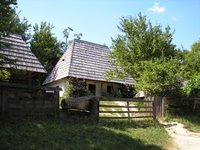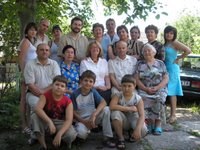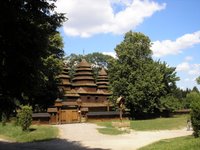




We traveled several hours southeast of Lviv to Zhuravno to meet Michael, Marco's youngest son. Michael said that his father was just 8 when grandpop left for America in 1903. Marco grew up to be a farmer, married and had 4 sons (Vasil, Ivan, Stephan, Michael) and two daughters (Catherine and Anna). I met many of the clan today. Such very nice people! All of them, men and women, are educated--there seems to be a large contingent of doctors and engineers. They were very hospitable to us and appear to be a really close family.
Michael, the patriarch, is an interesting man. He had to leave the table for a while to remove a fish hook from a small boy. Michael has the reputation of being an exceptional surgeon. The family showed me a newspaper clipping documenting a remarkable feat-Michael treated an emergency shooting accident with open-heart surgery. This in itself is amazing since the conditions in his small, rural clinic are primitive, at best. However, things became more astounding when my cousin stuck his finger in the hole the bullet left in the heart to stop the bleeding and then continued to repair the damage. The man is still alive today! He claims he was the only child in his big family to be educated because he was the youngest. The timing was just right to take advantage of the Soviet education system.
All this time I've sentimentally projected that only in America could the great-grandson of people from, at the time, the poorest country in Europe go to Harvard, one of the world's best schools. In truth, these cousins of my generation are all very well educated, courtesy of the Soviet government.
Most of the people we've talked to are extremely concerned about Ukraine's future. They are bitterly disappointed about the hopes the Orange Revolution raised and did not deliver. Marco, a respected surgeon for over 50 years, gets a monthly pension of $85. Over 8 million Ukrainians are working abroad and sending money home-much like it was for our relatives in the early 1900's.
Ukraine looks shabby today because the Soviets built apartment houses with reinforced concrete that was meant to last 25 years and be replaced with better housing. This never happened. Many of these dwellings are now falling apart and there is no money in the coffers to rebuild. We did see evidence of wonderful new homes in the process of construction. They were just abandoned when the Soviet Republic dissolved and the job market dried up.
The Soviets brought electricity to everyone. Gas lines are being run to the small villages but installing them is problematic and some people, like those in Hubici and Lacko, have been waiting for years and may continue to wait for the possiblity of an easier life without chopping wood.
Lviv has just gotten a bundle of money from UNESCO to do some repairs before its big birthday bash this autumn. The cobblestone streets were a mess with construction--should be beautiful, however, when done. The city has great old bones with fantastic Austro-Hungarian architecture but badly needs paint and prettying up.
I got a chance to do research in the Archives and was able to handle the old books themselves. These records are in Latin,not Cyrillic--which is a plus but it is still a difficult place to navigate. You must first find if they have what you need which is tricky since the clerks don't speak good English although they are very accommodating. We cobbled together a conversation of Ukrainian, English and French and seemed to make ourselves understood. The Wysocko records I wanted to see were not there but they did have some Hubici books. It takes at least two days to bring the records up from the huge basement vaults so it's best to visit the Archives on the first day of your stay or to write telling when you will be in Lviv and what you need. (archives2000@lv.ukrtel.net).
I spent 2 hours looking through Hubici birth records trying to find info about Marco. I kept wondering why there were no Wojtowicz (Voytovich) births for almost a hundred years when the graveyard is full of this name as is the village. I then discovered that there is another Hubici in the Sanok district of Poland, once part of Galicia, and that I was looking through the wrong records! We were leaving for Kyiv in a few hours so there was nothing I could do about the mistake. I also discovered that they have Cadastral land records for our Hubici. These are detailed maps showing the plots of land and their owners.
Lviv has a terrific folk park nestled in the woods, full of authentic houses and churches from all the oblasts of Ukraine. I finally saw examples of the fireplace shelves where the kids would sleep in the winter. Grandmom spoke of these and also of the thatched roofs that we saw.
Cousin Lesya invited us to dinner in her new flat and since she doesn't cook, Cousin Yaraslav helped in the kitchen. It was a tasty and cozy meal, another example of our family's generosity and kindness. I was upset to learn, however, that Catherine, Marco's only surviving daughter, sat at her window in Lacko waiting for us to visit. Supposedly she remembers my great-grandmother Eva very well and wanted to talk about her. I charged Cousin Yaroslav to act as the family historian in my stead and question her about the past before she dies-she's 87 and ailing. Modern Ukrainians don't seem too knowledgeable about their family's past. Few seemed to know much before their great-grandparents. Everyone was excited by my research, however. Maybe I've sparked some interest.
This was really a terrific, terrific experience-I'm proud to be related to the people we met!
Lviv Photos: Top: my dream home in Folk Park; next: our new family; next 2: Boyko church and home in Folk Park; last: old women selling flowers in street


0 Comments:
Post a Comment
<< Home